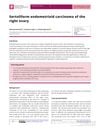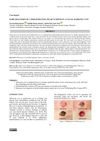 October 2023 in “Frontiers in endocrinology”
October 2023 in “Frontiers in endocrinology” Effective PCOS treatments require targeting specific signaling pathways.
 October 2023 in “bioRxiv (Cold Spring Harbor Laboratory)”
October 2023 in “bioRxiv (Cold Spring Harbor Laboratory)” Immune cells are essential for early hair and skin development and healing.
 September 2023 in “bioRxiv (Cold Spring Harbor Laboratory)”
September 2023 in “bioRxiv (Cold Spring Harbor Laboratory)” The mTurq2-Col4a1 mouse model shows that cells can divide while attached to stable basement membranes during development.
 September 2023 in “Nature communications”
September 2023 in “Nature communications” Alk1 in specific cells is crucial for proper nerve branching and hair function.
 September 2023 in “Frontiers in bioengineering and biotechnology”
September 2023 in “Frontiers in bioengineering and biotechnology” JAGGED1 could help regenerate tissues for bone loss and heart damage if delivered correctly.
 July 2023 in “Frontiers in veterinary science”
July 2023 in “Frontiers in veterinary science” Certain long non-coding RNAs are important for controlling hair growth cycles in sheep.
 July 2023 in “Journal of Natural Remedies”
July 2023 in “Journal of Natural Remedies” Shell ginger contains kavalactones that promote hair growth and have anti-cancer, anti-inflammatory, and anti-obesity effects.
 July 2023 in “Endocrinology, diabetes & metabolism case reports”
July 2023 in “Endocrinology, diabetes & metabolism case reports” Sertoliform endometrioid carcinoma of the ovary, though rare, has a good prognosis when treated early.
 June 2023 in “Journal of cosmetic medicine”
June 2023 in “Journal of cosmetic medicine” Hair follicle stem cells and mitochondria are key for hair growth, and targeting their activity could lead to new hair loss treatments.
 June 2023 in “Animal Bioscience”
June 2023 in “Animal Bioscience” Vimentin and transthyretin proteins are linked to black coat color in sheep.
 May 2023 in “Journal of Pharmaceutical Research”
May 2023 in “Journal of Pharmaceutical Research” Neem is highly beneficial for health and beauty with no major side effects.
 April 2023 in “Clinical theriogenology”
April 2023 in “Clinical theriogenology” The dog's skin condition improved after removing a tumor that was causing hormone imbalances.

Higher TGF-β signaling may increase skin cancer risk in organ transplant recipients.
 March 2023 in “Bagcılar medical bulletin”
March 2023 in “Bagcılar medical bulletin” A young woman had a rare tumor causing high male hormone levels and symptoms like excessive hair and acne. After removing the tumor, her hormone levels returned to normal. Early diagnosis is important.
 February 2023 in “Sibirskij onkologičeskij žurnal”
February 2023 in “Sibirskij onkologičeskij žurnal” Chemotherapy often causes hair loss in cancer patients, affecting their mental health, but scalp cooling can help prevent it.
 February 2023 in “Asian journal of pharmaceutical research and development”
February 2023 in “Asian journal of pharmaceutical research and development” Flavonoids in Iraqi marshland plants have potential health benefits like antioxidant and anti-inflammatory effects.
 January 2023 in “Postępy Dermatologii i Alergologii”
January 2023 in “Postępy Dermatologii i Alergologii” Azelaic acid treats acne, rosacea, and hyperpigmentation with minimal side effects.
 November 2022 in “CARDIOMETRY”
November 2022 in “CARDIOMETRY” A group has developed therapies that show promise for treating cancer and various other conditions.
 November 2022 in “Research Square (Research Square)”
November 2022 in “Research Square (Research Square)” The research provides insights into hair follicle growth in forest musk deer by identifying key genes and pathways involved.
 October 2022 in “Journal of advanced research in medicine”
October 2022 in “Journal of advanced research in medicine” A woman with Sheehan syndrome improved with hormone treatment.
 September 2022 in “Dermatology and therapy”
September 2022 in “Dermatology and therapy” Contact immunotherapy might help treat various skin conditions, but more research is needed to confirm its safety and effectiveness.
 September 2022 in “Research Square (Research Square)”
September 2022 in “Research Square (Research Square)” Increasing Rps14 helps grow more inner ear cells and repair hearing cells in baby mice.
 August 2022 in “International journal of research in pharmacy and chemistry”
August 2022 in “International journal of research in pharmacy and chemistry” Teak is a durable, termite-resistant wood with medicinal benefits.
 June 2022 in “bioRxiv (Cold Spring Harbor Laboratory)”
June 2022 in “bioRxiv (Cold Spring Harbor Laboratory)” ILC1-like cells can cause alopecia areata by attacking hair follicles.

Vitamin D is crucial for skin health and managing skin diseases.
 March 2022 in “Folia Medica Indonesiana”
March 2022 in “Folia Medica Indonesiana” The lump on a woman's scalp was a rare, potentially cancerous tumor from the hair follicle, not a common cyst.
 February 2022 in “Research Square (Research Square)”
February 2022 in “Research Square (Research Square)” High TSPEAR levels in colorectal cancer predict worse outcomes.

The document concludes that the development of certain tumors is influenced by genetic background and that a specific gene modification can lead to tumor regression and reduced growth.
 January 2022 in “Research Square (Research Square)”
January 2022 in “Research Square (Research Square)” High TSPEAR levels in colorectal cancer predict worse outcomes.
 December 2021 in “Aegean journal of obstetrics and gynecology”
December 2021 in “Aegean journal of obstetrics and gynecology” A woman's male-like physical changes were caused by two rare ovarian conditions.






























